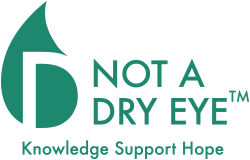
Dry Eye symptoms can flare up periodically or persist for a prolonged period of time. Sometimes important and necessary treatments, like topical medications or surgery, trigger new types of discomfort. With proper care and treatment, all of these symptoms eventually subside and flare-ups can become less frequent.
During times of prolonged discomfort or sudden flare-ups, it can be difficult to find relief while waiting for treatments to take effect or healing. And when there is pain and other discomfort in the eyes, literally everything else recedes into the background. It can even be very difficult to just get through the day.
Some doctors prescribe anesthetizing drugs, like Lyrica, that can mask these symptoms. These drugs may help temporarily. But unless the underlying conditions are treated, symptoms will return. And masking symptoms will not only mask the symptoms from you, but from your doctors as well. Because if you can’t feel it, you won’t report it to your doctors. They won’t be able to treat what they don’t know about, especially if something changes or a new condition crops up. And that could be a problem.
Temporary relief can sometimes be achieved with distractions that direct the mind toward something other than the symptom. This works because the mind is able to really focus on only one thing at a time – whether it’s a sensation or a thought. The object of the mind’s focus will be the one that’s the most prominent, while everything else recedes into the background.
Here are four distractions to help you get through the day.
1. Hold an ice cube wrapped in cloth to your eyebrow or cheekbone.
The sensation of ice on the skin near your eyes is particularly helpful during acute episodes of pain or other discomfort. Here’s what you need.
• Ice cube
• Clean, thin cloth, like an old T-shirt

Wrap one layer of the cloth around the ice cube. Hold the cloth, with the ice inside, to your eyebrow or cheekbone until you feel the coldness of the ice. Leave it there for a few seconds until your eye symptom subsides. Then pull it away. Keep touching the wrapped ice to different spots on your eyebrow or cheekbone as soon as you feel the symptom return.
The cloth shields your skin while absorbing the melting ice. You can try a paper towel, but the paper tends to rip when it gets wet. A thick cloth insulates the ice too much and you won’t feel the cold enough.
Never touch the piece of ice inside the cloth to your eyes, eye lids, or inside the eyes. Cold is the enemy of meibomian glands. It’s best to leave these glands at their normal temperature unless you’re doing a warm compress.
2. Eat something.
If you’ve noticed that your eyes feel better when you eat, you’re not alone. All of the sensations in the mouth – taste, temperature, texture – are great distractions that help to deflect focus from the symptoms in your eyes.
So eat something. Then keep eating.
Try to find something that doesn’t have too many calories and is generally healthy, especially if you’re going to eat for a long time.
One favorite is popcorn. Skip the fat and calories in the pre-packaged microwaveable bags, and make your own air-popped (if you have an air popper) or microwave popcorn.
Microwaving your own popcorn is the easiest thing in the world. Here’s what you need.
• Popcorn, any brand, any kind. Or try organic.
• A brown paper sandwich bag

Put enough popcorn into the sandwich bag to cover the bottom. Fold the opening down two or three times. Place the bag in the microwave with the folded side down. Push the popcorn button. Wait till it finishes popping.
You can eat it plain, or you can add salt or butter. Look for butter from grass-fed cows that is higher in Omega 3 fatty acids. Or try butter-flavored olive oil that mimics the flavor of movie theater butter, with the added benefit of being lower in Omega 6’s.
3. Engage your mind.
Activities that require some mental focus, but low visual focus, are great distractions. Try listening to music, audio books, talks shows… whatever interests you.


Crossword puzzles are one of the best distractions, but you will need a friend to read the clues, tell you how many letters are in the word, and which letters are already there. You’ll have to think about the clue, count the letters, and maybe visualize the word. The harder the crossword puzzle the more your mind will be distracted.
4. Watch or listen to comedies.
If you’re able to watch television without too much discomfort, this may be an option for you. But if not, you can try just listening.
Some movies and television shows are easier on the eyes than others.
Avoid dramas, especially if you cry easily at movies, because emotional tears exacerbate Dry Eye symptoms. Staying calm is also important. So it’s best to avoid horror movies, thrillers, or anything with suspense.
Comedies can help keep your mind distracted without exacerbating symptoms the way dramas and other genres can. Comedies might even help you find the humor or irony in your own situation.
Just be sure to blink and take frequent breaks if you’re watching TV or a movie.
These simple techniques distract the mind from Dry Eye symptoms and help you get through the day. Depending on your specific condition, some may work better than others. So try them, and see which ones work best for you.
View more tips for coping with Dry Eye and MGD.
How do you manage your symptoms? Send your tips and comments to blogger@notadryeye.org and we’ll share them with our readers in future blog posts.
Subscribe to our blog to keep up with Not A Dry Eye.
Support Not A Dry Eye Foundation. When you shop at smile.amazon.com, Amazon donates 0.5% of your purchase.

